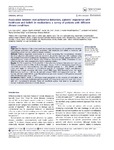Mostrar o rexistro simple do ítem
Association between non-adherence behaviors, patients’ experience with healthcare and beliefs in medications: a survey of patients with different chronic conditions
| dc.contributor.author | Cea-Calvo, Luis | |
| dc.contributor.author | Marín-Jiménez, Ignacio | |
| dc.contributor.author | De-Toro, Javier | |
| dc.contributor.author | Fuster-RuizdeApodaca, María J. | |
| dc.contributor.author | Fernández, Gonzalo | |
| dc.contributor.author | Sánchez-Vega, Nuria | |
| dc.contributor.author | Orozco-Beltrán, Domingo | |
| dc.date.accessioned | 2021-10-14T11:59:59Z | |
| dc.date.available | 2021-10-14T11:59:59Z | |
| dc.date.issued | 2019-10-15 | |
| dc.identifier.citation | Cea-Calvo L, Marín-Jiménez I, de Toro J, Fuster-RuizdeApodaca MJ, Fernández G, Sánchez-Vega N, et al. Association between non-adherence behaviors, patients’ experience with healthcare and beliefs in medications: a survey of patients with different chronic conditions. Curr Med Res Opin. 2019;36(2):293-300 | es_ES |
| dc.identifier.issn | 0300-7995 | |
| dc.identifier.uri | http://hdl.handle.net/2183/28624 | |
| dc.description.abstract | [Abstract] Objective: The objective of the current work was to assess the frequency of non-adherence behaviors and potential association with patients' experience with healthcare and beliefs in medicines self-reported by patients with four different chronic conditions.Methods: Patients responded anonymously to a survey comprising five non-adherence behaviors (based on physician and patient input), an assessment of patients' experience with healthcare using the validated Instrument to Evaluate the EXperience of PAtients with Chronic diseases (IEXPAC), and a validated Spanish version of the Beliefs about Medicines Questionnaire (BMQ). Associations of non-adherence behavior were analyzed using logistic regression models.Results: Of 1530 respondents, 53.1% reported ≥1 non-adherence behavior. Non-adherence rates were 59.8% in diabetes mellitus (DM), 56.0% in rheumatic disease, 55.6% in inflammatory bowel disease, and 42.8% in human immunodeficiency virus (HIV) infection patients (p < .001). IEXPAC and BMQ scores were higher in adherent vs. non-adherent patients. In multivariate analysis, non-adherence behavior was strongly associated with lower overall BMQ, lower BMQ Necessity scores and higher BMQ Concerns scores (p < .001 for all), and with a lower IEXPAC self-management score (p = .007), but not with the overall IEXPAC score. Non-adherence was more frequent in DM patients compared with HIV infection patients (p < .001).Conclusions: Patients' beliefs in medicines-a lower perception for the necessity of medication, and higher concerns in taking medication-and low patient self-management experience score were associated with non-adherence behavior. These are modifiable aspects that need to be addressed to increase medication adherence in chronic disease. | es_ES |
| dc.language.iso | eng | es_ES |
| dc.publisher | Taylor & Francis | es_ES |
| dc.relation.uri | https://doi.org/10.1080/03007995.2019.1676539 | es_ES |
| dc.rights | Atribución-NoComercial-SinDerivadas 3.0 España | es_ES |
| dc.rights.uri | http://creativecommons.org/licenses/by-nc-nd/3.0/es/ | * |
| dc.subject | Chronic disease | es_ES |
| dc.subject | Medication adherence | es_ES |
| dc.subject | Surveys and questionnaires | es_ES |
| dc.subject | Patient preference | es_ES |
| dc.subject | Patient satisfaction | es_ES |
| dc.subject | Beliefs about medicines | es_ES |
| dc.title | Association between non-adherence behaviors, patients’ experience with healthcare and beliefs in medications: a survey of patients with different chronic conditions | es_ES |
| dc.type | info:eu-repo/semantics/article | es_ES |
| dc.rights.access | info:eu-repo/semantics/openAccess | es_ES |
| UDC.journalTitle | Current Medical Research and Opinion | es_ES |
| UDC.volume | 36 | es_ES |
| UDC.issue | 2 | es_ES |
| UDC.startPage | 293 | es_ES |
| UDC.endPage | 300 | es_ES |
Ficheiros no ítem
Este ítem aparece na(s) seguinte(s) colección(s)
-
INIBIC-TCMR - Artigos [102]






